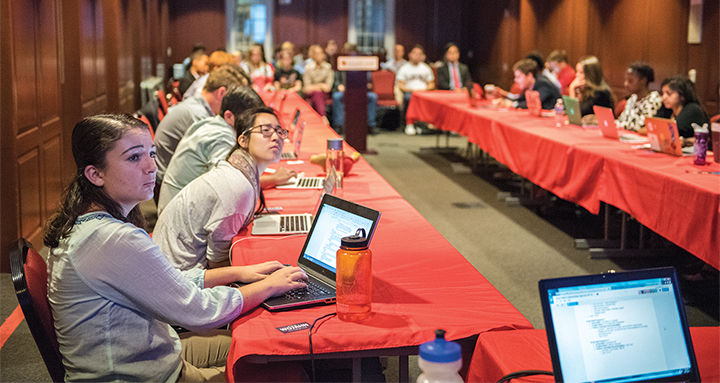
The legislature works during a student government association meeting on Oct. 7 in Riggs Alumni Center.
The SGA unanimously passed a resolution Dec. 2 urging the University Senate to pass legislation requiring advisory boards to have at least one student representative of each class standing on the board.
Throughout the semester, Student Government Association Vice President of Student Affairs Katherine Swanson and her committee worked on the resolution, which also calls for advisory boards to issue reports on candidates chosen, consider the creation of a common application to recruit students to advisory boards and a minimum two-meeting per year requirement.
READ MORE: SGA committee looks to streamline advisory board application process
“We didn’t feel there was a way for us to describe, in a bill, exactly what kind of person we wanted on an advisory board, but we knew by having an advisory board take one person of every year, they were likely to have a more diverse group of voices,” said Swanson, a junior government and politics major. “We are hopeful the people running the advisory board applications and recruitment process will think very deeply about the student they are choosing.”
At the start of the semester, the committee reached out to the SGA legislature and asked members to identify which advisory boards they are members of.
This was part of an effort to reach an estimation of how many total advisory boards are on the campus. In its research, the committee indexed a total of 21 boards, some of which include the Stamp Advisory Board, University Honors Student Advisory Board and the Student Advisory Board of the Counseling Center, said Julio Cerón, SGA off-campus and outlying representative.
“Katherine and I realized a lot of people who sit on the boards know each other, [are] probably part of the same clubs or probably a part of SGA and we wanted to fix that,” said Cerón. “There are so many advisory boards students can sit on, but not many people know about those.”
READ MORE: University of Maryland announces president’s diversity council members
Cerón added that a centralized common application that lists all the boards on-campus students could sit on would encourage more engagement and bring uniformity to the application process.
The committee recognized that many boards lack freshman representation, which Cerón said is especially concerning for living-learning program advisory boards that mostly affect freshmen and sophomores.
“We just wanted to make sure that freshmen were taken into consideration,” he said. “Because there are so many advisory boards, it’s oftentimes really difficult to see how many there are and where you should apply to sit on one.”
While researching the different advisory boards, Swanson said the committee found the behavioral and social sciences college Dean’s Student Advisory Council to be a model of how advisory boards should operate.
The DSAC consists of 15 members, including who represent each major within the college. The council holds elections twice a year and assesses candidates with the application and interviews.
DSAC chairwoman Jhansi Katakam said the council encourages freshmen to apply and get involved.
“Some of our most recent applicants who are now on the board for next semester are freshmen; it’s great to see that,” the senior psychology and physiology and neurobiology major said. “That’s one of the main things we want each year: more and more applicants. We want to get the word out.”



